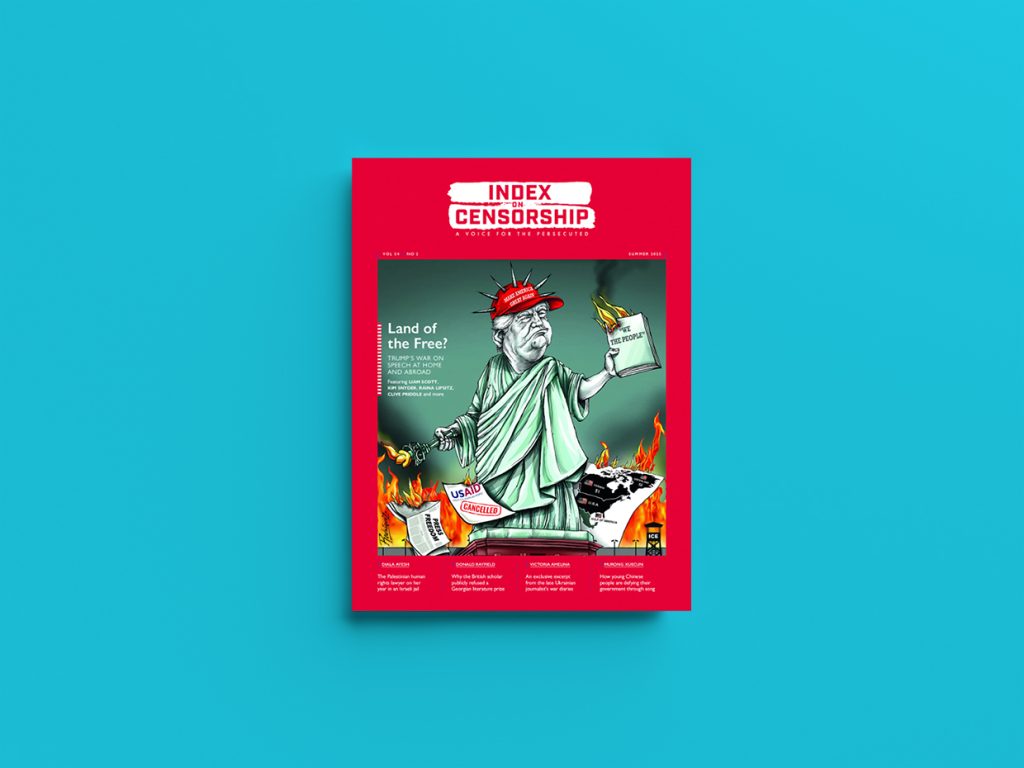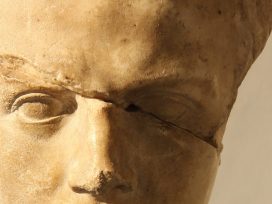
The Courts have acquiesced, the populace is compliant and the Democratic Party is splintered. Without any way to make their opposition felt, Trump’s opponents’ only hope is that the economy will cause MAGA voters to rethink.
Free speech in the US: how book bans are targeting independent thought; why Trump’s assault on education imitates Erdoğan’s; what the closure of Radio Free Asia means for the region’s information space; and how American liberals can learn from Soviet dissidents.
Titled ‘Land of the Free?’, Index on Censorship’s summer issue explores how the fundamental freedoms enshrined in the US Constitution – freedom of religion, speech, the press, protest and petition – are being dismantled by the current Trump administration.
Alongside funding cuts to research institutions, state-run broadcasters and USAID, Index editor Sarah Dawood highlights the Trump administration’s increasingly heavy-handed responses to criticism – including visa refusals and cancellations, the deployment of the National Guard to police protests, and threats to defund universities seen as ideologically unfriendly.

Book bans in US schools and public libraries are increasingly targeting independent thought and the culture of tolerance, writes Katie Dancey-Downs. Three states – Utah, South Carolina and Tennessee – are actively implementing powers to ban books, while in Texas a new bill gives school boards the power to oversee book selection.
The bans are often the result of well-organised campaigns by right-wing advocacy groups opposed to the discussion and teaching of gender identity and racial justice history in schools. As Dancey-Downs writes, this ‘is about much more than reducing library catalogues. It’s about controlling ideas.’
The trend, which Sabrina Baêta of PEN America describes as ‘distinctly un-American’, has escalated beyond schools and public libraries. The US navy has removed books ‘promoting DEI’ from the US Naval Academy Library, while the National Park Service has deleted all references to ‘transgender’ from the website of the country’s most important LGBTQ rights monument, along with a recommended reading list
However, some states are taking steps to oppose such censorship, adopting legislation to outlaw book bans and prevent governments from removing books on a political basis. Meanwhile, PEN America is teaming up with publishers, authors and families to take legal action against book bans in school libraries in Tennessee and Florida.
In Turkey, the country’s embattled academics, artists and independent media fear that an increasingly authoritarian United States is leaving them with less room for manoeuvre.
Since Recep Tayyip Erdoğan came to power in 2016 and his regime ‘began waging a culture war on anyone it deemed marginal and deviant’, independent journalists and scholars, publications, activists and NGOs have largely relied on international funding and support, Kaya Genç explains. The closure of USAID and other US funds means that the ‘ability of civil society institutions and independent media to retain some form of independence is now under threat’.
According to Genç, Trump’s assault on academic freedoms has been inspired by Erdoğan. He cites the case of Istanbul’s Boğaziçi University, whose government-appointed rector has sparked large protests by firing liberal scholars and banning its LGBTQ+ society. ‘As Erdoğan and Trump borrow from each other’s playbooks on multiple fronts’, writes Genç, ‘students, scholars, journalists and any citizens willing to voice their views could be facing the ominous prospect of a fine-tuned, unified and globally accepted autocracy in the near future’.
The Trump administration’s shuttering of US-funded international media outlets such as Voice of America and Radio Free Asia (RFA) has affected freedom of speech and access to information in East Asia, reports Rebecca L. Root. Outlets such as these ‘are a lifeline, offering a window into what’s happening at home and abroad amid wars and famines, disasters and conflicts’.
RFA first aired in 1996 and broadcast in nine languages in China, Myanmar, Vietnam, Laos, Cambodia and North Korea. Without it, writes Root, these countries’ citizens lack an alternative to censored local media and propaganda. RFA has also had to sever the contracts of most of its regional reporters, many of whom worked underground in authoritarian states like Cambodia or Myanmar, and who are now left with little protection.
Many of RFA’s US-based Asian employees have also been placed in a precarious position, since their visas are contingent on their employment status. In light of the abuses of power many of them have helped to expose, returning home could carry a serious risk. RFA has filed a lawsuit against the government, but the legal process is likely to drag on. Unless other funders can be found, citizens in East Asia will be left in an information limbo.
Can the experience of Soviet dissidents guide political activists in America in the struggle against repression and censorship? Martin Bright cites the historian Benjamin Nathans, author of a Pulitzer-winning account of the USSR’s dissident movement, who sees growing parallels between the repressive political climate in the US and the situation faced by opponents of the Soviet regime.
Soviet-era dissidents such as the Russian mathematician and poet Alexander Esenin-Volpin – a man once described by fellow-dissident Vladimir Bukovsky as ‘pathologically honest’ – could be a source of inspiration to liberal activists in the US, Bright argues. Rather than classical revolutionary radicalism, Esenin-Volpin called the Soviet government to account for ignoring the country’s constitution, which enshrined citizens’ right to freedom of expression.
In a situation where, as Nathans argues, it is ‘the courts and the press that are the front lines’, radical civil obedience might be more effective than traditional protest. After all, from George Washington to Alexei Navalny, at its heart dissidence consists in ‘the radical refusal to accept institutional untruth’.
Review by Alastair Gill
Published 2 September 2025
Original in English
First published by Eurozine
Contributed by Index on Censorship © Eurozine
PDF/PRINTSubscribe to know what’s worth thinking about.

The Courts have acquiesced, the populace is compliant and the Democratic Party is splintered. Without any way to make their opposition felt, Trump’s opponents’ only hope is that the economy will cause MAGA voters to rethink.

Whether an Ivy League academic or a Patriot Front white nationalist, Curtis Yarvin will find your position too democratic. The once obscure blogger’s brand of postliberalism calls for a political system reboot popular with MAGA and Big Tech leaders. But does his eccentric mix of elitist, pseudo-religious and computational thought reflect chaos more than his desired order?